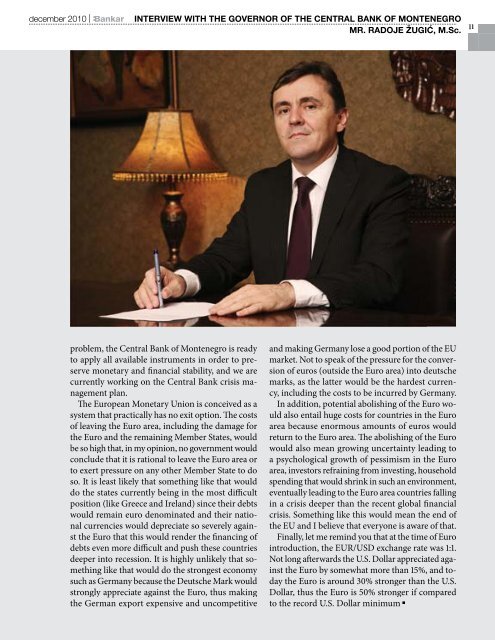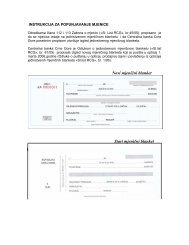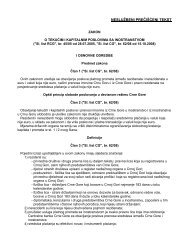Naši standardi moraju biti strožiji od međunarodnih - Cb-mn.org
Naši standardi moraju biti strožiji od međunarodnih - Cb-mn.org
Naši standardi moraju biti strožiji od međunarodnih - Cb-mn.org
You also want an ePaper? Increase the reach of your titles
YUMPU automatically turns print PDFs into web optimized ePapers that Google loves.
december 2010 | :Bankar :<br />
INTERVIEW WITH THE GOVERNOR OF THE CENTRAL BANK OF MONTENEGRO<br />
MR. RADOJE ŽUGIĆ, M.Sc.<br />
problem, the Central Bank of Montenegro is ready<br />
to apply all available instruments in order to preserve<br />
monetary and fi nancial stability, and we are<br />
currently working on the Central Bank crisis management<br />
plan.<br />
Th e European Monetary Union is conceived as a<br />
system that practically has no exit option. Th e costs<br />
of leaving the Euro area, including the damage for<br />
the Euro and the remaining Member States, would<br />
be so high that, in my opinion, no government would<br />
conclude that it is rational to leave the Euro area or<br />
to exert pressure on any other Member State to do<br />
so. It is least likely that something like that would<br />
do the states currently being in the most diffi cult<br />
position (like Greece and Ireland) since their debts<br />
would remain euro denominated and their national<br />
currencies would depreciate so severely against<br />
the Euro that this would render the fi nancing of<br />
debts even more diffi cult and push these countries<br />
deeper into recession. It is highly unlikely that something<br />
like that would do the strongest economy<br />
such as Germany because the Deutsche Mark would<br />
strongly appreciate against the Euro, thus making<br />
the German export expensive and uncompetitive<br />
and making Germany lose a go<strong>od</strong> portion of the EU<br />
market. Not to speak of the pressure for the conversion<br />
of euros (outside the Euro area) into deutsche<br />
marks, as the latter would be the hardest currency,<br />
including the costs to be incurred by Germany.<br />
In addition, potential abolishing of the Euro would<br />
also entail huge costs for countries in the Euro<br />
area because enormous amounts of euros would<br />
return to the Euro area. Th e abolishing of the Euro<br />
would also mean growing uncertainty leading to<br />
a psychological growth of pessimism in the Euro<br />
area, investors refraining from investing, household<br />
spending that would shrink in such an environment,<br />
eventually leading to the Euro area countries falling<br />
in a crisis deeper than the recent global fi nancial<br />
crisis. Something like this would mean the end of<br />
the EU and I believe that everyone is aware of that.<br />
Finally, let me remind you that at the time of Euro<br />
intr<strong>od</strong>uction, the EUR/USD exchange rate was 1:1.<br />
Not long aft erwards the U.S. Dollar appreciated against<br />
the Euro by somewhat more than 15%, and t<strong>od</strong>ay<br />
the Euro is around 30% stronger than the U.S.<br />
Dollar, thus the Euro is 50% stronger if compared<br />
to the record U.S. Dollar minimum §<br />
11











